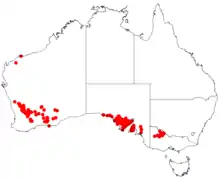Acacia ancistrophylla
Acacia ancistrophylla is a shrub of the genus Acacia and the subgenus Plurinerves that is native to several areas on southern Australia.
| Acacia ancistrophylla | |
|---|---|
| Scientific classification | |
| Kingdom: | Plantae |
| Clade: | Tracheophytes |
| Clade: | Angiosperms |
| Clade: | Eudicots |
| Clade: | Rosids |
| Order: | Fabales |
| Family: | Fabaceae |
| Clade: | Mimosoideae |
| Genus: | Acacia |
| Species: | A. ancistrophylla |
| Binomial name | |
| Acacia ancistrophylla | |
 | |
Description
The prickly shrub typically grows to a height of 0.4 to 2.5 metres (1 to 8 ft)[1] and has a dense or obconic habit. It has glabrous or sparsely haired branchlets. Like most species of Acacia it has phyllodes rather than true leaves. The glabrous leathery and evergreen phyllodes are patent to erect with a narrowly oblong oblanceolate, linear or linear-oblanceolate shape and are straight to slightly curved. Th phyllodes have a length of 1.2 to 4.8 cm (0.47 to 1.89 in) and a width of 1.5 to 5 mm (0.059 to 0.197 in) and have many closely parallel nerves obscure to distinct.[2] It blooms from August to October and produces yellow flowers.[1]
Taxonomy
The species was first described in 1904 by the botanist Cecil Andrews.[3]
There are three recognised varieties:
- Acacia ancistrophylla var. ancistrophylla
- Acacia ancistrophylla var. lissophylla
- Acacia ancistrophylla var. perarcuata
Distribution
It has a scattered distribution through southern Western AustraliaW, south-eastern parts of South Australia and north-western Victoria.[2] In Western Australia it is found in the Wheatbelt and Goldfields-Esperance regions and is commonly situated on hills, plains, and ridges growing in clay, sandy or loamy soils often over or around limestone.[1]
See also
References
- "Acacia ancistrophylla". FloraBase. Western Australian Government Department of Parks and Wildlife.
- "Acacia ancistrophylla". World Wide Wattle. Western Australian Herbarium. Retrieved 4 October 2020.
- Andrews, Cecil R. P. (1904). "Additions to the West Australian Flora". Journal of the West Australian Natural History Society. Perth: V.K. Jones. 2 (1): 40–41 – via Biodiversity Heritage Library.